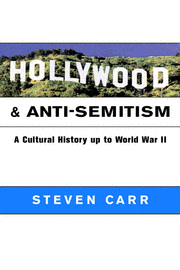Book contents
- Frontmatter
- Contents
- List of Illustrations
- Acknowledgments
- Introduction: What Is the Hollywood Question?
- Part 1 The Hollywood Question and American Anti-Semitism, 1880–1929
- Part 2 The Hollywood Question for a New America, 1929–1941
- 3 A New Deal for the Hollywood Question
- 4 The Hollywood Question in Popular Culture
- 5 The Politics of the Hollywood Question
- 6 Answering the Hollywood Question
- Part 3 The Hollywood Question, 1941 and Beyond
- Notes
- Bibliography
- Index
4 - The Hollywood Question in Popular Culture
Published online by Cambridge University Press: 10 December 2009
- Frontmatter
- Contents
- List of Illustrations
- Acknowledgments
- Introduction: What Is the Hollywood Question?
- Part 1 The Hollywood Question and American Anti-Semitism, 1880–1929
- Part 2 The Hollywood Question for a New America, 1929–1941
- 3 A New Deal for the Hollywood Question
- 4 The Hollywood Question in Popular Culture
- 5 The Politics of the Hollywood Question
- 6 Answering the Hollywood Question
- Part 3 The Hollywood Question, 1941 and Beyond
- Notes
- Bibliography
- Index
Summary
WHAT PRICE, HOLLYWOOD QUESTION?
Hollywood ultimately invited – perhaps even required – interpretation and explanation of itself. The publicity departments of the movie studios generated apocryphal tales of larger-than-life stars and behind-the scenes intrigue. Countless books shared “inside information” on how to break into movies, how to write for them, and how to become a star. The familiar tropes of the American Dream reverberated throughout this discourse of almost attainable success. Desired by many, only a lucky few could achieve, keep, and enjoy it. Indeed, such perceptions had some basis. Considering the industry's output and worth, Hollywood employed relatively few people, as Leo Rosten found in 1941. Approximately thirty thousand people were working in Hollywood in 1937, yet the industry supposedly ranked fourteenth of any U.S. industry in its volume of business, and eleventh in its total assets. Such discrepancy between industry size and economic stature was conspicuous, especially during an economic depression.
Within popular culture, the interpretation and explanation of Hollywood – highlighting both its contradictions and its peccadilloes – consistently invoked the Question in a way that faithfully and obviously hailed heterosexual whites. While one could scrutinize the motion picture industry from a variety of subject positions, the Hollywood Question viewed America through the eyes of its whites. Nonfiction and fiction alike, religious literature, political protests from both the right and the left, voices from the mainstream and on the margins – even Hollywood movies themselves – ultimately acceded to a belief in Jewish agency. This belief – that Jews ultimately behaved as Jews – had nothing to do with the diversity and complexity of the American Jewish experience.
- Type
- Chapter
- Information
- Hollywood and Anti-SemitismA Cultural History up to World War II, pp. 132 - 153Publisher: Cambridge University PressPrint publication year: 2001



